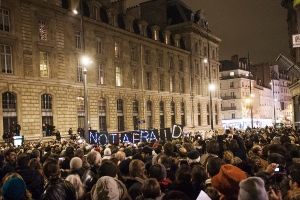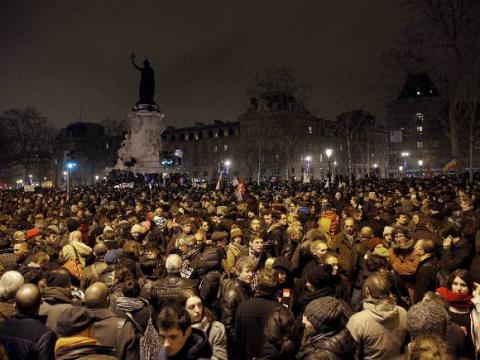After the Charlie Hebdo's Massacre - Support Those who Fight the Religious-right; "There is no way they will make us put down our pens."
- After the Charlie Hebdo's Massacre - Support Those who Fight the Religious-right - Secularism is a Women's Issue
- Charlie Hebdo: "There is no way they will make us put down our pens." - Karima Bennoune (openDemocracy)
After the Charlie Hebdo's Massacre - Support Those who Fight the Religious-right
January 7, 2015
Secularism is a Women's Issue (SIAWI)
After the massacre in Charlie Hebdo in Paris today, January 7, 2015, expressing indignation, as so many are doing, is not enough.
A quick look at the English-speaking media shows that whilst many condemn the violence itself, they also assert that Charlie Hebdo courted (and maybe deserved) a strong response from "Muslims". Charlie's regular cartoonists did not spare Islam, any other religion, nor fanatics and bigots.
This trend in the media requires our attention. Apparently secularists, agnostics and atheists must keep silent and do not deserve the kind of respect that believers are entitled to; nor can they enjoy free speech to the same degree.
In the name of "respect" of religions and of the religious sentiments of believers, it is indeed the fanatical religious-Right that is being supported and given centre stage. Meanwhile, those who are on the forefront of countering armed fundamentalists are left to their own devices. It is high time to give these secularists prominence, to recognise their courage, their political clarity and to stop labeling them "Islamophobic".
In October 2014, secularists - including atheists, agnostics and believers from many countries, in particular many Muslim-majority countries, met in London to denounce the religious-Right and to demand being seen as its alternative. It is high time to learn from their analysis and lived experience.
Today's tragic massacre in Paris will undoubtedly give fuel to the traditional xenophobic far-Right and the immediate danger is an increase in racism, marginalization and exclusion of people of Muslim descent in Europe and further. We do not want to witness "anti-Muslim witch hunts" nor do we welcome the promotion of "moderate Islamists" by governments as official political partners. What is needed is a straightforward analysis of the political nature of armed Islamists: they are an extreme-Right political force, working under the guise of religion and they aim at political power. They should be combated by political means and mass mobilisation, not by giving extra privileges to any religion.
Their persistent demand for the extension of blasphemy laws around the world is a real danger for all. France has a long - and now growingly endangered - tradition of secularism; which allows dissent from religions and the right to express this dissent. It has had a rich tradition to mock and caricature powers that be - religious or otherwise. Let us keep this hard won right which cost so many lives in history, and, alas, still does - as Charlie Hebdo's twelve dead and numerous wounded demonstrate today.
Marieme Helie Lucas, Algerian Sociologist and Secularism is a Women's Issue Founder
Maryam Namazie, Spokesperson of Council of Ex-Muslims of Britain, One Law for All and Fitnah - Movement for Women's Liberation
Karima Bennoune, Professor and Martin Luther King Jr. Hall Research Scholar, University of California, Davis School of Law
Harsh Kapoor, South Asia Citizens Web (sacw.net)
Peter Tatchell, Director, Peter Tatchell Foundation
Houzan Mahmoud, Kurdish women's rights activist- London/UK
Ali al-Razi, Ex-Muslim Forum
Anissa Daoudi, Birmingham University, Head of Arabic Section
Chris Moos, Secularist Activist and Researcher
Deeyah Khan, Norwegian Filmmaker and Founder/CEO of Fuuse
Fahima Hashim, Director of Salmmah Women's Resource Centre in Sudan
Fariborz Pooya, Founder of the Iranian Secular Society and Co-host of Bread and Roses TV
Fatou Sow, International Director of Women Living Under Muslim Laws
Fiammetta Venner, Writer and Filmmaker
Gita Sahgal, Founder of Centre for Secular Space
Imad Iddine Habib, Founder of the Council of Ex-Muslims of Morocco
Inna Shevchenko, Leader of FEMEN
Julie Bindel, Writer
Kate Smurthwaite, Comedian and Activist
Magdulien Abaida, Libyan Activist and President of Hakki (My Right) Organization for Women Rights
Meredith Tax, Centre for Secular Space
Mina Ahadi, International Committees against Stoning and Execution
Nadia El Fani, Tunisian Filmmaker
Nina Sankari, Vice President of Atheist Coalition of Poland
Peter Tatchell, Director, Peter Tatchell Foundation
Ramin Forghani, Founder of the Ex-Muslims of Scotland and Vice-Chair of the Scottish Secular Society
Safak Pavey, MP for Istanbul, Turkish Parliament
Soad Baba Aïssa, Founder of Association pour la mixité, l'égalité et la laïcité
Terry Sanderson, President of the National Secular Society
Waleed Al-Husseini, Palestinian blogger and Founder of the Council of Ex-Muslims of France
Yasmin Rehman, Women's Rights Advocate
Nira Yuval Davis, Professor and Director of the research centre on Migration, Refugees and Belonging of the University of East London
Siamak Bahari, Political Activist and Editor of Children First Publication
Sultana Kamal, Bangladeshi Human Rights Activist
Taslima Nasrin, Bangladeshi-born Writer
Tehmina Kazi, Director of British Muslims for Secular Democracy
Laura Guidetti, Marea Italian Feminist Review
Lila Ghobady, Iranian Writer and Filmmaker
Hala Aldosari, Women's Health Researcher and Women's Rights Women's Activist
Codou Bop, Groupe de recherche sur les femmes et les lois au Sénégal
Daayiee Abdullah, Imam of Light of Reform Mosque
Zeinabou Hadari, Centre Reines Daura des Ressources pour la promotion, le Développement et le Rayonnement de la Femme Niger.
Ayesha Imam, researcher, Nigeria
The list will be updated on Jan 8
[Many thanks to the signers for sending this to Portside.]

Charlie Hebdo: "There is no way they will make us put down our pens."
By Karima Bennoune
January 8, 2015
openDemocracy
Pen against kalashnikov: courage against atrocity. People of Muslim heritage call for combatting Islamist ideology by political means and mass mobilization.
We are all Charlie!

"Was at Place de la Republique. Everyone is out. it's a very special vibe. I felt like i saw all the characters in my neighborhood, everyone seemed familiar, in a soft wave of people going towards the square. They chanted, 'nous sommes tous charlie!' and 'libert, d'expression!' mostly. And there's the 'not afraid' signs, which were incredible."
Photo by Danielle Voirin, for Planet Waves, Inc.
To those who attacked Charlie Hebdo yesterday shouting "Allahu Akbar," I would like to say that your kind of God - a God of Hate and Murder - is not Great. Nor is that God the God of most Muslims, but rather of your own Islamist cult - which so many people of Muslim heritage oppose. You are incapable of understanding satire; you openly revile the beliefs of others but brook no criticism of the medieval notions you believe. You claim to defend Islam while bringing only shame upon it. You are offended by cartoons but not by killing. You claim to have avenged the Prophet Mohamed but have instead defamed him with your cowardly attack on unarmed journalists in his name.
As a Tunisian woman wrote to me afterwards, "It is so horrible, claiming the name of God while killing these poor people. But, about which God are they speaking?" With an ironic outrage, worthy of Charlie Hebdo itself, she insisted the deity would be "gratified" that they are "making him a God of intolerance and blood." In the name of tolerance and peace, and in memory of the tragically murdered victims in Paris, and of so many others - even more numerous - in places like Peshawar, let us commit after this bleak January day to make 20 15 the year we finally put an end to this ghastly jihad.
While first information suggests the authors of the Paris attack may have claimed affiliation with Al Qaeda in Yemen, others suspect an "Islamic State" link. In any case, their indisputable connection is with the pernicious ideology of international Islamism and its myriad armed manifestations. These are, to quote Algerian sociologist Marieme Helie-Lucas, "political movements of the extreme right that. manipulate religion to achieve their political aims." We must collectively denounce that ideology and do all we can to defeat these movements. As Helie-Lucas and Maryam Namazie wrote in an online petition in denunciation of the Charlie Hebdo attack, a statement rapidly signed by activists from Iran to Sudan, "What is needed is straight-forward analysis of the political nature of armed Islamists: they are an extreme-right political force, working under the guise of religion and they aim at political power. They should be combated by political means and mass mobilization.."
This latest horror is but one in a long line of Muslim fundamentalist assaults on thought. "Those who combat us with the pen will die by the sword," decreed the Armed Islamic Group in Algeria in the 1990s while slaughtering intellectuals. Just this December, an Algerian Salafist called for the public execution, possibly by crucifixion, of prominent writer Kamel Daoud, a free-thinker who recently made waves with his rewriting of Camus's "The Stranger" from an Algerian perspective, and who dared to say in a television appearance that Arabs must reflect on the role of religion in their societies to move forward.
**While I am first and foremost outraged by the Islamist ideologues who make such threats, and the terrorists like those who perpetrated yesterday's massacre, I also blame **some liberals and left-wingers - and even human rights advocates - in the West who have for years apologized for Islamism and Islamist ideas, painted Islamists mainly as victims with legitimate grievances standing up to the West, or defenders of Muslim culture, rather than extreme right wingers with guns determined on squashing human rights. These Western apologists have justified everything from the burqa to theocracy in the name of cultural relativism - appalling many intellectuals of Muslim heritage who are determined instead to buck extremism. Some of these voices were heard again in the U.S. media yesterday emphasizing the "offensiveness" of Charlie Hebdo's content. In Western academia, this apologia has often been a politically correct stance, what Mahnaz Afkhami decries as "Islamic exceptionalism." So, one way to commemorate this terrible event and memorialize its victims is to unequivocally defend universal human rights, including the right to freedom of expression, and to make clear that they apply to all. We must dare to defend even the right to blaspheme, the right that the Charlie Hebdo staff paid with their lives for asserting.
Many people of Muslim heritage - from Saudi Arabia to Sudan, from Afghanistan to Algeria, have been in the frontlines of the fight against terror and extremism. But so many more of us in the diasporas need to find the courage to speak out in support of them. After the Sydney attack and on the same day as the Peshawar massacre, CNN featured a Muslim American blogger whining about the fact that Muslims are expected to condemn jihadist attacks. I no longer have any patience for this sort of view. Those of us who are proud of our heritage, who have diverse and complex relationships with the Islam of our forebears, can make a difference by speaking out against every single one of these crimes whose miserable perpetrators wrongfully claim to act as agents of the religious heritage we value. (This is akin to suggesting that Jews can advance the cause of human rights by criticizing the Israeli government's violations since it claims to represent them, even while they are in no way collectively responsible for such abuses.) We should have a Million Muslim March, or the virtual equivalent, every single time an event like this happens.
Our community organizations should move from reactive condemnations of terrorism post hoc, to proactive, systematic efforts to root out Islamist ideology through awareness-raising, and humanist education. We must also do more to support those doing this work back home in our countries of origin. As difficult as it can be to speak out in our highly charged contemporary environment in which the Western far right campaigns against Islam - akin to "walking on a tightrope" as one young Arab-American activist recently described it - it takes just a fraction of the moral courage shown by those most at risk. Pakistani lawyer Asma Jahangir, who has to have armed guards in her Lahore office, implored the diaspora community to speak out about the slaughter in countries like hers when I interviewed her.
It is especially critical not to blame the victims for the Paris attack, however challenging some of their drawings and writings may have been for some. That is what satirists do - push boundaries. That is their right, and indeed modern society needs those who dare to claim that none of our emperors have any clothes. Charlie Hebdo are equal opportunity offenders, lampooning the Pope, Jewish orthodoxy and the Mullahs. Many people of Muslim heritage appreciate satire. The late great Pakistani arts promoter Faizan Peerzada told me of the Danish cartoons that Charlie Hebdo reprinted, "if this cartoon was seen by Mohamed, he would have had a laugh. As simple as that."
Meanwhile, the extreme right wing and other anti-Muslim forces in the West cannot be allowed to overlook such defiance among people of Muslim heritage, or to smear all of Islam or its adherents - or immigrants writ large - because of attacks like the one in Paris. As Caroline Fourest, an expert on fundamentalisms and former member of the editorial staff of Charlie Hebdo told me yesterday, the magazine is itself both anti-fundamentalist and secularist - and resolutely anti-racist. "Racism must not be an excuse for fundamentalism. And fundamentalism must not be an excuse for racism," she insisted. "We have to fight both at the same time." She is absolutely correct, and these will both be long struggles.
After twenty years of writing about Muslim fundamentalist violence, I am running out of synonyms for atrocity. And for courage. During my recent research about opposition to fundamentalism among people of Muslim heritage, I was given a copy of the newspapers published at Press House in Algiers on the very next day after a 1996 Armed Islamic Group bombing there that killed 18 press workers and their neighbors. I have thought about this story a great deal in the last 24 hours.
Somehow the Algerian journalists rallied back in 1996 and got their editions out, working to do so in the rubble of their offices before the smoke had even cleared. One of them, a woman named Ghania Oukazi, posed the following question in that day's heroic papers, a question just as relevant now. "Pen against Kalashnikov. Is there a more unequal struggle?" She answered it herself with this commitment. "What is certain is that the pen will not stop." Yesterday's terror attack in Paris is a stark reminder that to defeat all forms of fundamentalism and terror we must always honor Ghania's pledge. As Caroline Fourest exclaimed when telling me her surviving former colleagues were determined to rally and get an issue of Charlie Hebdo next week: "there is no way they will make us put down our pens."
[Karima Bennoune is a Professor of Law at the University of California, Davis School of Law, and former Amnesty International Legal Advisor. Her book, Your Fatwa Does Not Apply Here: Untold Stories from the Fight Against Muslim Fundamentalism, won the 2014 Dayton Literary Peace Prize. Karima recently gave the TED Talk: When people of Muslim heritage challenge fundamentalism.]
[Many thanks to the author for sending this to Portside.]


Spread the word